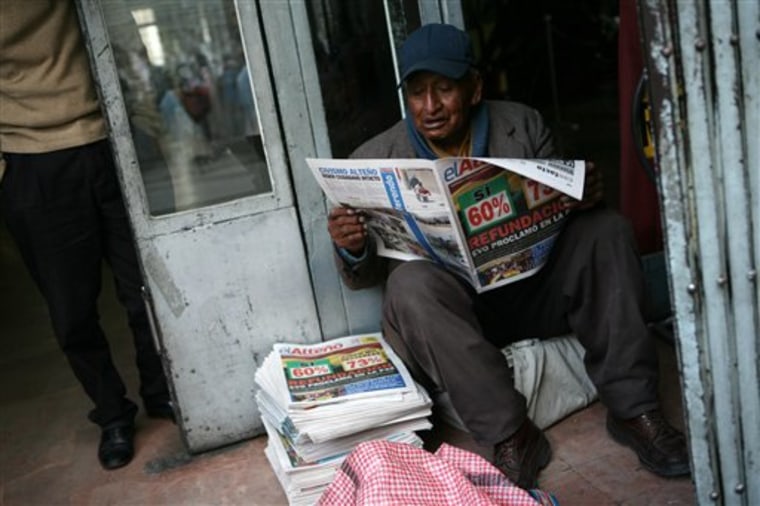Racially torn Bolivia was as divided as ever on Monday despite easy approval of a new constitution that seeks to empower the long-suppressed indigenous majority.
In approving the document, voters also granted its principal backer, President Evo Morales, the opportunity to run for re-election and remain in power through 2014.
The constitution drew heavy majorities in the pro-Morales highlands, but the "no" vote prevailed in four of Bolivia's nine states — all in the prosperous lowlands, where some said opposition may linger.
"It would be an enormous blunder for the government to try to impose" the new charter, said Carlos Dabdoub, a pro-autonomy leader in the lowlands.
'The new Bolivia'
Bolivia's first Indian president said passage of the document ends "colonial" rule in South America's poorest country by expanding indigenous rights.
"Here begins the new Bolivia. Here we begin to reach true equality," Morales told crowds at the presidential palace after unofficial quick counts showed the constitution winning 59 percent approval.
Official results, with one in three votes tallied, gave it 53 percent, though rural districts where Morales is strongest are traditionally slower to report. An official vote count will be announced Feb. 4.
The victory was historic for the Aymara, Quechua, Guarani and dozens of other indigenous groups who only won the right to vote in 1952, when a revolution broke up large haciendas on which they had lived as peons for generations.
But the constitution's rejection by the mestizo and European-descended minority foreshadows a continuing political battle.
The document grants autonomy both to 36 indigenous "nations" and to opposition-controlled states. But the two categories are given a vaguely defined "equal rank," likely creating rival claims to open land in Bolivia's east, whose large soy and cattle interests and valuable gas reserves drive much of the economy.
Limit to size of future landholdings
The new constitution allows Morales to run for re-election in December, when Bolivians also will fill a reorganized Congress.
The constitution will also limit the size of future landholdings to 5,000 hectares (12,000 acres), but current landholders are exempt from the cap.
Morales, elected in 2005 on a pledge to nationalize the country's lucrative natural gas reserves, has allied himself closely with Venezuelan President Hugo Chavez in what the two leaders call "21st century socialism."
Morales has increased the state's presence throughout the economy — nationalizing telecommunications as well as the hydrocarbons sector — and, like Chavez, expanded benefits for the poor.
